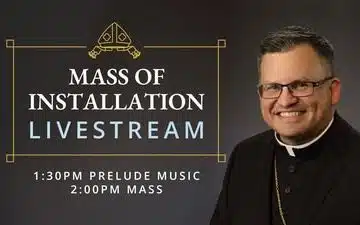Render to Caesar, But to God First

Among the more puzzling scenes in Sacred Scripture are the Caesar’s coin passages in the synoptic Gospels. Read in isolation, Jesus’ somewhat cryptic interaction with his inquisitors is difficult to understand. But when read in the context of St. Paul’s Epistle to the Romans and through the lens of the Feast of Christ the King, we can appreciate Jesus’ profound teaching in this key event. The passage has profound practical implications for how we situate earthly politics into our spiritual lives. Indeed, it is an admonition for many of us to assert the truth of the Gospel in all aspects of life, including political life.
The first thing to note about the Caesar’s coin scene is that Jesus’ inquisitors are not interested in asking Him a sincere question: the Pharisees “plotted how they might entrap him in speech” (Mt. 22:15). Recognizing this, Jesus does not actually answer the question but instead deflects it. Rather than detract from the passage’s importance, these rhetorical interactions between the Pharisees’ inquisitors and Jesus help us see its purpose in the Gospels.
The Pharisees’ emissaries begin the conversation with insincere flattery when they say, “Teacher, we know that you are a truthful man and that you teach the way of God in accordance with the truth” (Mt. 22:16). “Tell us then,” they continue, “Is it lawful to pay the census tax to Caesar?” The Pharisees’ ambassadors don’t care what the answer is, because either “yes” or “no” will serve their purpose.
If Jesus answers “yes,” they think He would be admitting that Caesar has authority over Him and his followers, which would disabuse Jesus’ disciples that He was their King. The Pharisees could thus say that Jesus is a fraud and His followers are delusional, probably sending many away.
If Jesus answered “no,” the Pharisees could accuse Jesus of treason: denying Caesar’s authority to tax was a capital offense. And, of course, all who were identified as Jesus’ disciples would be implicated in the treachery.
So, the Pharisees would have been happy with either a “yes” or a “no.” To their disappointment, they got neither. Instead, in a rhetorical dodge, Jesus gave a cryptic non- answer, “Whose image is this and whose inscription?” To which they replied those were Caesar’s. “Then repay to Caesar what belongs to Caesar,” Jesus said, “and to God what belongs to God.” The Gospels’ authors then tell us that Jesus’ accusers went away “wondering” at His words. Jesus had foiled them, and they knew it.
While the Pharisees left without either answer they wanted, Jesus’ response has profound meaning for the way we, His followers, ought to understand the relationship between His heavenly kingdom and the earthly nations in which we all dwell. It gives us the foundation for our understanding of the distinct, but inherently interrelated realms.
To “repay” Caesar is to acknowledge the legitimacy of earthly government. Jesus tells us that there is a strong presumption (albeit rebuttable—see below) that His followers owe obedience to the earthly government. Earthly government is instituted by God, St. Paul tells us in Romans 13, and as a general rule is to be obeyed. “For there is no authority except from God,” St. Paul explains, because government has been established by God (Rom. 13:1). We Christians are therefore to be conscientiously subject to legitimate government (Rom. 13:5).
Of course, Jesus does not stop at “repay to Caesar.” Rather, in the same sentence he adds that we are to repay “to God what belongs to God” (Mt. 22:21). This tells us that there are two distinct realms, the government and the Church (to use shorthand), each with a distinct role in people’s lives. But while distinct, they are neither equal nor separate; instead, Jesus is telling us that Caesar’s rule is qualified and subordinate, while God’s is absolute and superior. Caesar’s image and inscription are temporal and limited. Emperors come and go. But everything that exists is God’s, who is eternal and never- changing. Thus, all government is subordinate to God as His “ministers,” to use St. Paul’s term in Romans 13:6.
This latter clarification suggests that the presumption to obey the government may be overcome if government’s rule is not consistent with the Church’s. St. Paul is clear about this qualification: “Pay to all their dues,” he teaches; “taxes to whom taxes are due … toll … respect, … [and] honor to whom” these things are due (Rom. 13:7).
This implies that there may be times when taxes, respect and honor are not due. This is not a blanket endorsement to pick and choose the laws we obey. No earthly government is perfect, and the issue is not that simple. I am suggesting, however, that we Catholics should not be any more shy about asserting our moral positions as policy preferences than a secular person is about asserting theirs. For it is not only individuals who should be obedient to God, but governments as well. In the words of Pope Pius XI as he instituted the Feast of Christ the King in his encyclical, Quas Primas, “If the kingdom of Christ … receives, as it should, all nations under its way, there seems no reason why we should despair of seeing that peace which the King of Peace came to bring on earth” (QP, 20).
 Dr. Kenneth Craycraft holds the James J. Gardner Chair of Moral Theology at Mount St. Mary’s Seminary & School of Theology. He is the author of Citizens Yet Strangers: Living Authentically Catholic in a Divided America (OSV 2024).
Dr. Kenneth Craycraft holds the James J. Gardner Chair of Moral Theology at Mount St. Mary’s Seminary & School of Theology. He is the author of Citizens Yet Strangers: Living Authentically Catholic in a Divided America (OSV 2024).
This article appeared in the November 2024 edition of The Catholic Telegraph Magazine. For your complimentary subscription, click here













